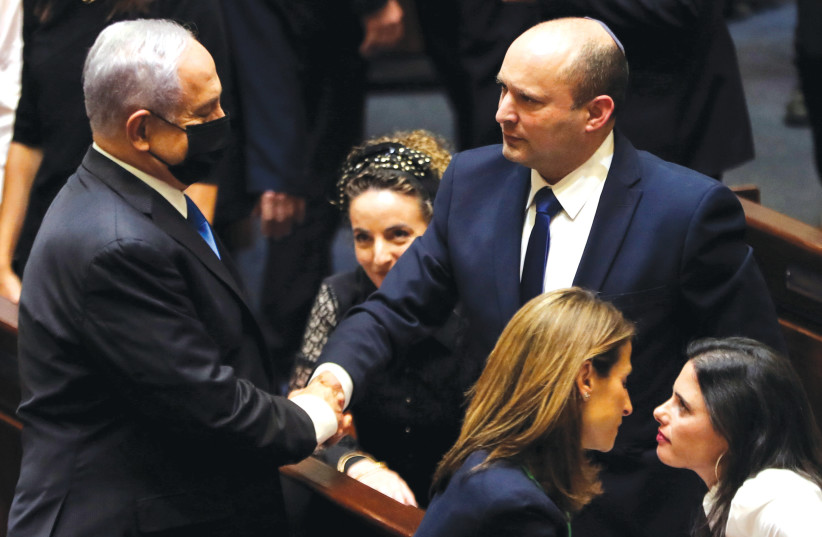Justice Minister Gideon Sa’ar went from studio to studio on Wednesday, threatening on the three nightly newscasts to break up the current coalition if the Knesset does not reaffirm by Monday a directive giving Israel legal jurisdiction over Israelis living in the West Bank.
Sa’ar was repeatedly asked whether he would seek a new election or be willing to join a new government in the current Knesset led by opposition leader Benjamin Netanyahu.
But the truth is that Sa’ar loathes both of those options: the choice between an election in which his New Hope Party would be destroyed and breaking his campaign promise from the last election to not sit under Netanyahu is like choosing between death by poison or hanging.
The reason Sa’ar is threatening is that he desperately wants to keep the current government together. He knows that rebel MKs in Ra’am (United Arab List) and Meretz also do not want to commit political suicide, and the rebels who broke off from Yamina cannot bring down the government over a bill that would cause great harm to residents of Judea and Samaria.
But sometimes in politics an empty threat can go a long way. Politics is often the art of deception, and the most veteran political players are often the most adept at it.
Netanyahu
The best example, of course, is Netanyahu himself, who will on Friday become the second oldest MK after Bennie Begin, when United Torah Judaism MK Ya’acov Litzman’s resignation takes effect. Netanyahu was one of the youngest MKs when first elected in 1988, and he is even more skilled than Sa’ar at saying he wants one thing in order to get something else.
Asked by The Jerusalem Post at a news conference on Monday whether he preferred forming a new coalition in the current Knesset if the government falls, or going to an election, Netanyahu said “in this Knesset – theoretically – would be better.”
Sitting alongside his fellow opposition heads who all prefer forming a new government under Netanyahu without an election, the opposition leader told them what they wanted to hear.
But then he left to meet with a very successful veteran American political strategist who has worked with him in the past and arrived in Israel to start planning the next race.
The polls are looking too good for Netanyahu to not take another shot at getting the 61 MKs for his bloc that he tried to obtain in four recent elections.
Ben-Gvir
The big winner in last week’s Post poll was MK Itamar Ben-Gvir, predicted to win six seats running separate from the Religious Zionist Party. That proves Israelis also do not mind voting for politicians who are brutally honest.
Ben-Gvir, who once led a march of farm animals opposite a gay pride parade, surprisingly told Army Radio on Thursday that he would not protest the gay pride parade because “gays and lesbians are my brothers and sisters.” When a politician has a reputation for being honest, they can change their minds without consequences.
Mansour Abbas
The true test of honesty in politics is with another honest politician whose party is expected to teeter on the electoral threshold: Ra’am leader Mansour Abbas.
Abbas told Arabic Radio Nas on Thursday that he honestly wants the current government to continue.
“I could have brought down this coalition and become a Palestinian national hero, but I am a responsible leader who cares about the future of Arab society and all of Israeli society,” Abbas said.
If an election is initiated after Abbas admitted that he did not want it, he will pay a political price and that would be another lesson: when it comes to politics, honesty does not pay.

